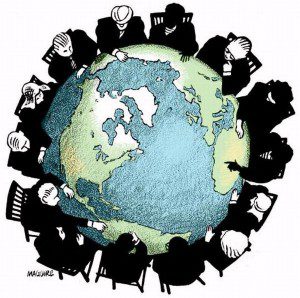Contributing Writer for Wake Up World
Perhaps it’s human nature to form collectives. Our collectives have grown over time from tribal to national. And our collectives have morphed to include entities which are not human or natural at all.
The idea that corporations are equal entities among national collectives of individuals is not natural and is not human, certainly not pro-human. In fact one has to shed both common sense and human decency to even consider lending institutions the rights of individuals and inviting them, as equals and friends, into any collective.
In order to understand anything it is important to boil it down, as if a math problem, and consider the lowest common denominators.
Institutions United?
Institutions are not individuals. Institutions can exist for hundreds or thousands of years. They do not need clean air, water and food. They do not need companionship. Institutions are not your friends. They are simply mechanizations. Institutions in the world today seek unlimited growth and to prevent losses.
Institutions take on a certain life of their own, but are only characterizations created by individuals. They are tools of, for, and by people – and normally only a select few people. Institutions are normally oligarchical to one extent or another. An oligarchy is a pyramid system where ‘the few’ are in control of ‘the many’; the steeper the slant, the more oligarchical the institution.
The U.S.A. was founded on flattening the oligarchical world. “Life, liberty and the pursuit of happiness” for all. But now, with the build-up of the military industrial complex, the private prison system and a slew of institutions that benefit the few at the cost of the many, the U.S.A. is just another oligarchical nation among many. Perhaps no other recent legislation in the U.S.A. so spurs oligarchical collectivism as the Supreme Court decision on Citizen’s United.
In this case, the Court’s decision basically allows unlimited spending for political campaign advertising under the guise of the First Amendment. However the First Amendment of the Bill of Rights was written to bestow rights on individuals, by limiting what institutions were allowed to do – and not the other way around. The law enables oligarchical collectivism by allowing for very few wealthy people to fund entire election campaigns instead of many contributors from the community.
If the Supreme Court interpreted the Bill of Rights as it was written for individuals, they would have kept the spending cap. The Bill of Rights was not meant to expand the rights of institutions. It describes the rights of individuals, especially the First Amendment. In fact the First Amendment describes acts which only flesh and blood humans can do. The First Amendment describes rights of individuals which can, when used correctly, defeat oligarchical collectivism, ensuring a level playing field. But when those rights are applied to institutions, the oligarchy is bolstered, further empowering those already in power.
In this one Supreme Court decision, we can see how governments essentially promote or prohibit, and that the things they promote and prohibit shape the formation of the nation. And through this decision, we can see that our governments have forgotten that their role is to regulate commerce and protect individuals, not protect commerce and regulate individuals. The Supreme Court decision on Citizen’s United is part of a new global paradigm; lending the rights of man to machines. It is part of the global tendency to disproportionately value institutionalization rather than individuation.
Today, most nations promote and prepare for war, pouring their resources into war machines and and reinforcing institutional thinking – which in turn prohibits peace and individuation. War is totally anti-individual. The notion that militarism builds individual character is not true. Physical training builds character; increased learning and experience builds character; brotherhood builds character; war kills individuals for collective ambitions.
The U.S.A. is without doubt the biggest war country in the world now. It’s economy depends on being in a constant state of war. In peace individuals can devote time and energy to their surroundings and themselves. In war, institutions and collective thinking become the focus. The war mentality encourages separation, not oneness. It is built on a narrative of “us” versus “them”.
Four Mental and National States
If one boils down the idea that government institutions promote and prohibit, there are essentially four types of States in the discussion of war and peace.
One state is of peace; it promotes peace and only prepares for peace. Another state is of war; it promotes war and only prepares for war. Another state is at war; it promotes war, and yet prepares for peace. And the last state is at peace; it promotes peace and yet is ready for self-defense if the need arises. One can imagine being in these states, either internally and externally, and realize which is the more balanced and prepared state.
The concept of the four states can be applied to both internal and external states as well as to both individuals and institutions. This metaphor of the duality of polarity – The Matrix of Four – as applied to the notions of war and peace, and promotion and prohibition, is the metaphor of our thinking and being. People as well as states are either at peace or at war.
Why has the United States transformed from a state of the fourth type – one that is at peace, promotes peace and yet is prepared for defense – into a state that is at war, promotes war and prepares for war?
The United States of America is being taken over by institutions and institutionalization. It is turning into the worst type of nation; promoting and preparing for war on people outside our nation, with the biggest military budget in the world; and promoting and preparing for war on people inside our nation, with increasingly anti-individual laws and the biggest prison business in the world.
I strive to be at peace and to promote peace; to always be ready to defend myself, to defend others around me, and defend peace itself.
Previous articles by Ethan:
- SaṃsÄra and Nirvana – the Ultimate Duality
- We Have Sustainable Energy Technology – the Problem is the Oligarchy
- Why Governments Promote Deadly Nuclear Energy and Ban Beneficial Hemp
- Open Letter to Barack Obama: a Call to End the Disastrous Nuclear Era
- The 5 Tibetan Rites of Rejuvenation: 108 Movements to a Meditative Mind State
- How to Enhance Intuition: Understanding the Four Forms of Awareness
- A Little Green Revolution: the Rainbow Warriors will Heal the Earth Mother
- Hate: The Ultimate Social Control Mechanism
- UK’s Proposed Ban on Esoteric Knowledge: Why Institutions Seek to Limit Access to Information
- Presence and Mindfulness: the Meditative Value of 108
- Is Nuclear Experimentation Fascism?
- The Great Unsaid: What 1984 Can Teach Us About 2014
- The Brotherhood of Man: a Tibetan Perspective
- Oligarchical Collectivism and the Four Steps to Learning Politics
- Meditation and Intuition in the Fourth Age of Deception (the Kali Yuga)
About the author:
 Author, activist and Tai Chi teacher Ethan Indigo Smith was born on a farm in Maine and lived in Manhattan for a number of years before migrating west to Mendocino, California. Guided by a keen sense of integrity and humanity, Ethan’s work is both deeply connected and extremely insightful, blending philosophy, politics, activism, spirituality, meditation and a unique sense of humour.
Author, activist and Tai Chi teacher Ethan Indigo Smith was born on a farm in Maine and lived in Manhattan for a number of years before migrating west to Mendocino, California. Guided by a keen sense of integrity and humanity, Ethan’s work is both deeply connected and extremely insightful, blending philosophy, politics, activism, spirituality, meditation and a unique sense of humour.
The events of September 11, 2001 inspired him to write his first book, The Complete Patriot’s Guide to Oligarchical Collectivism, an insightful exploration of history, philosophy and contemporary politics. His more recent publications include:
- Tibetan Fusion a book of simple meditative practices and movements that can help you access and balance your energy
- The Little Green Book of Revolution an inspirational book based on ideas of peaceful revolution, historical activism and caring for the Earth like Native Americans
- The Matrix of Four, The Philosophy of the Duality of Polarity on the subject of the development of individual consciousness
- 108 Steps to Be in The Zone a set of 108 meditative practices and steps toward self discovery and individual betterment, including techniques to develop balance, transmute sexual energy and better the self
- and the controversial book, Terra-ist Letters, a work that humorously contrasts the very serious issues of global nuclear experimentation promotion and global marijuana prohibition
For more information, visit Ethan on Facebook and check out Ethan’s author page on Amazon.

If you've ever found value in our articles, we'd greatly appreciate your support by purchasing Mindful Meditation Techniques for Kids - A Practical Guide for Adults to Empower Kids with the Gift of Inner Peace and Resilience for Life.
In the spirit of mindfulness, we encourage you to choose the paperback version. Delve into its pages away from screen glare and notifications, allowing yourself to fully immerse in the transformative practices within. The physical book enriches the learning process and serves as a tangible commitment to mindfulness, easily shared among family and friends.
Over the past few years, Wake Up World has faced significant online censorship, impacting our financial ability to stay online. Instead of soliciting donations, we're exploring win-win solutions with our readers to remain financially viable. Moving into book publishing, we hope to secure ongoing funds to continue our mission. With over 8,500 articles published in the past 13 years, we are committed to keeping our content free and accessible to everyone, without resorting to a paywall.







